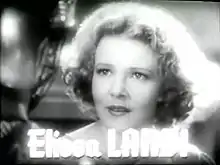Elissa Landi
Elissa Landi (born Elisabeth Marie Christine Kühnelt; December 6, 1904 – October 21, 1948) was an Italian-born Austrian-American actress and novelist who was popular as a performer in Hollywood films of the 1920s and 1930s.[1] She was noted for her alleged aristocratic bearing.[2]
Elissa Landi | |
|---|---|
 Trailer for After the Thin Man (1936) | |
| Born | Elizabeth Marie Christine Kühnelt December 6, 1904 Venice, Italy |
| Died | October 21, 1948 (aged 43) Kingston, New York, U.S. |
| Occupation | Actress |
| Years active | 1926–1943 |
| Spouse(s) | John Cecil Lawrence (m. 1928; div. 1936) Curtiss Thomas (m. 1943) |
| Children | 1 |
.jpg.webp)
Biography
Landi was born Elisabeth Marie Christine Kühnelt[3] in Venice to Austrian military officer Richard Kühnelt and his wife Caroline. She was raised in Austria and educated in England. From 1928 to 1936, she was married to John Cecil Lawrence, and from 1943 to 1948 to Curtis Kinney Thomas (1905-2002).
Landi's first ambition was to be an author. She wrote her first novel at the age of twenty, and returned to writing during lulls in her acting career.[4] She debuted on stage in Dandy Dick (1923).[3] She joined the Oxford Repertory Company at an early age, and appeared in many successful British and American stage productions. In 1926 she starred in Dorothy Brandon's Blind Alley in the West End.
During the 1920s she appeared in British, French, and German films before traveling to the United States to appear in a Broadway production of A Farewell to Arms (1930). [4] Her other Broadway credits included Empress of Destiny (1938), Apology (1943), and Dark Hammock (1944).[5]
She was signed to a contract by Fox Film Corporation (later 20th Century Fox) in 1931. She was paired successfully with some of the major leading men, including David Manners, Charles Farrell, Warner Baxter, and Ronald Colman, in romantic dramas such as Body and Soul (1931, which also featured Humphrey Bogart).
In 1931, She starred in the Fox feature, The Yellow Ticket along with a young Laurence Olivier, Lionel Barrymore and Boris Karloff. Raoul Walsh directed. The film was based on Michael Morton's 1914 play and was about a young Jewish girl, who obtains a prostitute's passport during a period Jews were not allowed such freedom so that she can travel around Czarist Russia to visit her sick father.

Fox loaned her to Paramount to play Mercia, the female lead in Cecil B. DeMille's 1932 film adaptation of the play The Sign of the Cross. DeMille said he chose her for the role because "There is the depth of the ages in her eyes, today in her body and tomorrow in her spirit."[6]
She starred in the box office hit The Count of Monte Cristo (1934) with Robert Donat.
Her contract with Fox was abruptly cancelled in 1936 when she refused a particular role. Metro-Goldwyn-Mayer signed her, and after a couple of romantic dramas, she played the cousin of Myrna Loy in the very popular After the Thin Man (1936). She retired from acting in 1943, after making only two more films.
Landi became a naturalized U.S. citizen in 1943, and dedicated herself to writing, producing six novels and a series of poems. She had published her first novel as early as age nineteen. She continued writing novels at the height of her movie fame, and for the rest of her short life.
She died from cancer in Kingston, New York at age 43, and was buried at Oak Hill Cemetery in Newburyport, Massachusetts.
Elissa Landi has a star on the Hollywood Walk of Fame for her contributions to Motion Pictures, at 1611 Vine Street.[7]
Filmography


- London (1926)
- Bolibar (1928)
- Underground (1928)
- Sin (1928)
- The Inseparables (1929)
- The Parisian (1930)
- Knowing Men (1930)
- The Price of Things (1930)
- Children of Chance (1930)
- Body and Soul (1931)
- Always Goodbye (1931)
- Wicked (1931)
- The Yellow Ticket (1931)
- Devil's Lottery (1932)
- The Woman in Room 13 (1932)
- A Passport to Hell (1932)
- The Sign of the Cross (1932)
- The Warrior's Husband (1933)
- I Loved You Wednesday (1933)
- The Masquerader (1933)
- By Candlelight (1933)
- Man of Two Worlds (1934)
- The Great Flirtation (1934)
- Sisters Under the Skin (1934)
- The Count of Monte Cristo (1934)
- Königsmark (1935)
- Enter Madame (1935)
- Without Regret (1935)
- The Amateur Gentleman (1936)
- Mad Holiday (1936)
- After the Thin Man (1936)
- The Thirteenth Chair (1937)
- Corregidor (1943)
References
- Obituary Variety, October 27, 1948, page 55.
- (in French) "La vie que tu t’étais imaginée", Nelly Alard, Collection Blanche, Gallimard, 03-01-2020.
- Monush, Barry (2003). Screen World Presents the Encyclopedia of Hollywood Film Actors: From the silent era to 1965. Hal Leonard Corporation. p. 408. ISBN 978-1-55783-551-2. Retrieved January 21, 2020.
- O'Brien, Scott (2020). Elissa Landi Cinema's Empress of Emotion. Orlando, FL: BearManor Media. pp. ix–x. ISBN 978-1-62933-631-2.
- "Elissa Landi". Internet Broadway Database. The Broadway League. Archived from the original on January 21, 2020. Retrieved January 21, 2020.
- Time, Volume 20. Time Incorporated. 1932. p. 32.
- "Elissa Landi". Hollywood Walk of Fame. Archived from the original on February 23, 2018. Retrieved January 21, 2020.
- "(photo caption)". The Brooklyn Daily Eagle. New York, Brooklyn. January 4, 1943. p. 8. Retrieved January 6, 2016 – via Newspapers.com.

External links
| Wikimedia Commons has media related to Elissa Landi. |